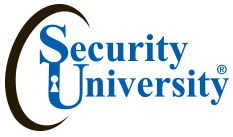Getting wireless certified with Security University shows your Qualified.
The IDC estimates that there would be 152,200 IoT devices connected every minute by 2025, indicating that there would be about 80 billion IoT devices connected annually. While IoT devices have numerous benefits and are immensely helpful for different purposes, they also pose as attractive vulnerabilities for cybercriminals. Be it insecure passwords, networks, ecosystem interfaces or any other vulnerability and weakness, once an IoT device is compromised, it can lead to major losses for any organization, and not just financially.
| Class Fee: | $3,990 |
| Time: | 72 hrs |
| Learning Level: | Intermediate |
| Contact Hours: | 40 hr 1 wk + 32 hr pre-study & 2hr exam |
| Prerequisites: | Understanding of TCP/IP Protocols |
| Credits: | 50 CPE / 3 CEU |
| Method of Delivery: | Residential (100% face-to-face) or Hybrid |
| Instructor: | TBD |
| Method of Evaluation: | 95 % attendance 2. 100 % completion of Lab |
| Grading: | Pass = Attendance+ labs & quizzes Fail > 95% Attendance |
Sample Job Titles:
Network security engineers
Cybersecurity analysts
Network and security analysts
Full stack engineers
Information system security architects
Network security administrators
Product security analysts
IT security analysts
Security test engineers
Application security testers/analysts
Security delivery analysts, etc.
This 72 hour accelerated class is taught using face to face modality or hybrid modality. Class includes 72 hours of contact studies, labs, reading assignments and final exam - passing the final exam is a requirement for graduation.
This class is about security testing and attack surface management to teach Penetration Testing as a Service (PTaaS) using a penetration testing and vulnerability management platform. Its experts perform deep dive manual penetration testing of application, network, and cloud attack surfaces, historically testing over 1 million assets to find 4 million unique vulnerabilities. NetSPI is headquartered in Minneapolis, MN and is a portfolio company of private equity firms Sunstone Partners, KKR, and Ten Eleven Ventures. This IoT security class also incorporates hands-on practical exercises for a thorough experiential and practical learning experience to the participants.
The course aims to cover the following:
Introduction to Wireless IoT security
Introduction to basic IoT
Terminology and initiatives
Device security and gateway security
Communication protocols
IoT cloud platforms and their security
IoT ecosystem and penetration testing approaches
Attack and fault trees
Threat modelling IoT systems, applications and hardware
IoT testing and security automation
IoT hacking
This course is highly recommended for current and aspiring:
- Lesson 1 - Domain 4: IoT testing and security automation
- Lesson 2 - Domain 1: Introduction to Wireless IoT security
- Lesson 3 - Domain 2: Attack and fault tree
- Lesson 4 - Domain 3: IoT ecosystem and penetration testing approaches
- Lesson 5 Domain 5: IoT hacking
- Lesson 6 Domain 6: Privacy and Security
- Lesson 7 Domain 7: IoT Pen Testing
Grades - All students must ordinarily take all quizzes, labs, final exam and submit the class practical in order to be eligible for a Q/ISP, Q/IAP, Q/SSE, or Q/WP credential unless granted an exception in writing by the President. Know that Q/ISP classes draws quite the spectrum of students, including "those less comfortable," "those more comfortable," and those somewhere in between. However, what ultimately matters in this course is not so much where you end up relative to your classmates but where you end up relative to yourself in on Friday of class. The course is graded as a pass or fail solely on your attendance and participation. Those less comfortable and somewhere in between are not at a disadvantage vis-à-vis those more comfortable. Escalating labs help you prepare for real world scenarios. Each labs escalates upon itself, increasing in intensity, rising to the next level, while you’re mitigating the threat step by step.
Books - No books are required for this course. However, you may want to supplement your preparation for or review of some lectures with self-assigned readings relevant to those lectures' content from either of the books below. The first is intended for those inexperienced in (or less comfortable with the idea of) hacking. The second is intended for those experienced in (or more comfortable with the idea of) hacking. Both are available at sites like Amazon.com. Both are avail at the SU Hacker Library. Realize that free, if not superior, resources can be found on the SU website.



